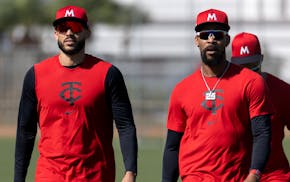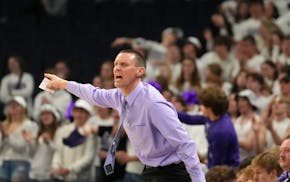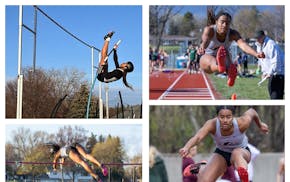The auction took place in cities scattered across the country, no one knowing the others' bid, only that other hands were shooting up.
And in December, when Denver pledged a record-breaking $110 million expansion fee for a National Women's Soccer League team — the highest ever for any women's sports franchise — Minnesota Aurora co-founder Andrea Yoch described it as exciting for women's sports, but also: "Daunting."
Daunting for leadership of the local pre-professional club, which had come up short once in 2022, then withdrew again in 2024, in its bid to go pro and join the country's top women's soccer league.
The community-owned team has drawn plenty of fans, media attention and talented college players while operating as an amateur-level summer club. And heading into its fourth season — armed with a tougher schedule, new head coach and hunger for what feels like an overdue trophy — it just saw the bar to go pro skyrocket.
Money talks
Just three years ago, $2 million could cover the franchise fee of a new NWSL expansion team. That's pocket change now, considering the Mile High City's $110 million deposit doesn't include the stadium or startup operations costs Denver has pledged.
Denver's club, the 16th to join the NWSL, will start play in March 2026 alongside a new team in Boston.
"It's no different than sitting in a charity live auction," Yoch said. "If the person across the room raises their hand and adds more money to the package, then the price just went up."
When Minnesota announced it would withdraw its second franchise bid in August, a statement to the Aurora's community owners noted that "circumstances out of our control kept us from pursuing the bid at this time."
Those circumstances included complications with the financial commitment of an investor, whom Yoch did not name, after the Aurora had submitted their final bid.
"We literally were throwing Hail Mary passes everywhere," said Yoch. The U.S. Soccer Federation requires pro teams to have a majority investor pledge at least 35% ownership.
"People who were on the board, minority investors — everybody was picking up the phones and trying to find someone."
In January, the Athletic reported that Denver's majority investor — Denver Sports Commission founder Rob Cohen — had previously been interested in being a minority investor for both Denver and Minnesota, which is not permitted by league rules.
When asked about this reporting, a representative for Denver's ownership group opted not to provide a comment.
With no viable lead investor, the Aurora withdrew from the expansion process for a second cycle. Months later, Denver's success has clarified more of what Minnesota will need if it wants to field a pro women's soccer team.
The jewel of the Midwest
Money matters because, to NWSL leadership, facilities matter.
In 2023, Kansas City made history by finishing construction of the $117 million CPKC Stadium, the world's first women's soccer-specific venue. It greets travelers headed south into downtown Kansas City, right on the banks of the Missouri River.
For a league that had mostly been a gracious guest in Major League Soccer stadiums, Kansas City's cozy-but-exclusive digs are seen as a major, if expensive, draw for a new NWSL team. No worrying about playing second fiddle to the men's schedules, no restraints on the amount of team branding they can splash on the concourse.
The Current sold out all 11,500 seats for every home game in 2024 and hosted the league championship in November.
An independent stadium like Kansas City's was not a part of Minnesota's franchise bid, said Yoch.
"What we've done cannot be unseen," said Angie Long, an investment banker and a primary owner of the Current, alongside her husband, Chris.
NWSL Commissioner Jessica Berman said as much when, in November, she announced Denver, Cincinnati and Cleveland were the latest expansion finalists.
"There's probably nothing more important than our teams controlling their own destiny, both from a stadium and a training facility perspective," Berman told reporters ahead of the 2024 championship.
Yoch, in attendance at that final, watched as familiar faces stood on CPKC Stadium's field, lifting the league trophy after the Orlando Pride defeated the Washington Spirit 1-0.
The Wilf family, the owners of the Vikings, bought the NWSL's Orlando Pride and its MLS counterpart, Orlando City SC, in 2021. Bullish on soccer, the Wilfs helped the Pride rise from league bottom dwellers to the squad that put together the best season in NWSL history.
They've supported the Aurora by leasing out the Vikings' practice facility, TCO Stadium, for home games, and "day in and day out, doing everything they can to have Aurora be successful," said Yoch. But since they own another NWSL club, they cannot put money behind a Twin Cities bid.
The Aurora had communities that had written to express "demonstrated interest" in providing land for practice facilities and worked out details with Minnesota United leadership to propose hosting home matches at Allianz Field in St. Paul. There was "some crossover" between the Loons ownership and members of the Aurora's bid, Yoch said.
A public pitch
If the proposal was right, the NWSL seemed willing to take a gamble on a city without a historic women's sports market or booming men's soccer attendance.
Denver was, at the time, the largest American city without a pro women's sports team. Its Major League Soccer team, the Colorado Rapids, drew the fewest average fans per game in the MLS last season (15,686).
"If it was a popular vote, Aurora would be going to the NWSL, but it's not," Yoch said, referencing the club's pre-existing fanbase. "This is a small group of owners that make the decision."
Instead, the league seems bullish that robust financial investment, combined with audience appetite for the league's product, will help the NWSL strike gold in the Rockies. Denver has already reached 10,000 season ticket deposits.
The NWSL has not set a timeline for when it might expand again, but in April, Berman said she envisions the league reaching an "NFL-size" 32 teams.
The Aurora could also go a different route and pursue leveling up into one of several new professional leagues that have begun play this year, or will in the near future.
The eight-team Gainbridge Super League kicked off last August and is owned by the same United Soccer League governing body as the Aurora's current amateur league. Two new leagues — WPSL Pro and an NWSL reserves league — are settling themselves a tier below the NWSL and Super League as Division II options, filling a gap in the player development pathway while still paying player salaries.
Cleveland's NWSL bidding group plans to put its resources into WPSL Pro as one of its initial 15-20 cities playing in 2026.
Yoch said the Aurora are open to exploring multiple options to move up the professional pyramid, even listing Canada's new Northern Super League as a possibility.
A new league is likely to draw fewer nationally recognized players than the NWSL, but buy-in would be less expensive. Stakeholders in the Super League have even contacted the Aurora, said Yoch, hoping to learn about how it grew its attendance to an average of 5,400-plus fans.
One step at a time
For all the buzz of expansion, the Aurora know they need a strong foundation.
This year, some things stay the same for the team. FOX 9 returns to broadcasting its home games, and seven "OGs" are set to return — players who have competed for the club since its inaugural season.
More things are new: a new front-of-jersey sponsor, Allina Health; $850,000 raised in a new ownership drive to cover day-to-day operational expenses after its initial $1 million fundraised in 2021 lasted through last fall; and a new chief of staff position, filled by Saara Hassoun.
Hassoun previously served two seasons as chief of staff for NWSL club NY/NJ Gotham FC, winning a title with the team in 2023. Having founded a sports consulting firm and studied player well-being through Harvard's Global Sports Initiative, Hassoun will manage soccer and business operations for the club.
"It's no secret that Aurora has ambitions to grow," said Hassoun, who worked with the Aurora to evaluate its players' experience and well-being after the club's inaugural season in 2022. "One of the biggest things that investors look for is: How are you doing now? What do your operations look like? How responsibly are you operating the club?"
There will be changes on the field, too. Former assistant coach and Minnesota Gopher Jen Larrick takes the helm as head coach, and several of last year's starters won't return, having inked professional contracts in countries like Canada, the Philippines, Portugal and Iceland.
The Aurora put themselves to the test in a 0-0 preseason exhibition against Indy Eleven (the team that knocked Minnesota out early in the playoffs the last two seasons) and will again on Sunday against KC Current II, the reserves for the NWSL squad.
"Everything is to win the championship, right? We're not shying away," said Yoch. "You can't win all of your regular season games for three straight years, then not go deep in the playoffs."
In the long-term quest to go pro, on-the-field results and media attention can help but are only two pieces of the puzzle. Even the buzz of WNBA star Caitlin Clark jumping into Cincinnati's investor group wasn't enough to win the bidding war.
"We just have to keep making as much noise as we can," Yoch said. "The only way Aurora [are] going to go pro is if someone that is interested in investing in sports steps up and says, 'I will be your lead investor,' and that that person can really help determine a lot of our future.' "

Carlos Correa goes on injured list; Twins add shortstop Ryan Fitzgerald to roster

Boys basketball: Albany, Lakeville North announce head coaching changes
